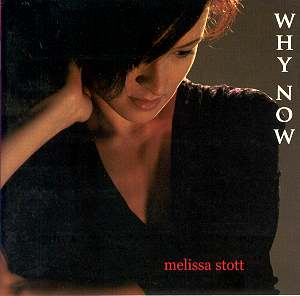Mamiís Kitchen
Why Now
Donít You Get It
Youíre Through
An Imaginary Girl
Suspicion
Ella
I Think Of You
Dreaming
You Donít Love Me
Anyone Can See That Iím In Love
A Long, Long Way
Why Now (alternative take)
www.leorecords.com
www.melissastott.com
This is the first of a brace
of recordings made for Feet First by the talented
young lyricist and singer Melissa Stott. She
was born in Manchester to a Singaporean-Chinese
mother and an English father and now lives
in Italy where sheís married to the pianist
and trumpeter Max Chirico.
This album shows some original
touches. She writes her own confidential-sounding
lyrics which are artful without being either
gauche or self-conscious. The pangs of love
and loss feature prominently in such songs,
ones couched in the vernacular of the American
Songbook. She sings in an American accent.
The range of influences here
embraces Jump bands, bossa nova, Stan Getz,
Ella Fitzgerald and some mainstream swing.
To all this Stott brings cultivated and powerful
musical taste. She sounds to have been strongly
influenced in matters of timbre and material
choice by American expatriate Stacey Kent,
though her voice is darker than Kentís and
stronger in the lower register.
We start with a swinger in
Mamiís Kitchen and move onto bossa
influence in the title track, of which we
also have an alternative take as an envoi.
There are Great American Songbook touches
in Donít You Get It where trumpeter
Stjepko Gut sounds rather Bunny Berigan-ish.
Thereís maybe a Peggy Lee-Mr Rhythm Man
sort of tinge to Youíre Through. I
have to say I canít share Stottís admiration
for Ellaís scat singing in Suspicion
Ė itís a affiliation she indulges in her second
Feet First album as well, though Gutís emulation
of Clark Terry is pretty good. All the solos
here are first class. Funnily enough in the
circumstances the song Ella has nothing
to do with Fitzgerald. Dreaming reminds
me strongly of a Stacey Kent-Dave Newton vocal
and piano performance swung gently over a
Latin rhythm.
Then there are other neat
touches Ė the bluesy workout on You Donít
Love Me with its funky Gut solo; the arco
bass solo that opens Anyone Can See That
Iím In Love and the straight ahead A
Long, Long Way that closes the album with
swinging excellence.
This earlier, debut album
sees Stott more immersed in swing than she
was to become in the second album, which Iím
also reviewing, in which she embraces bop
more clearly. Stott is a real talent and her
balance of the personal-confessional and the
outgoing brings a satisfying look to her programme.
Jonathan Woolf
